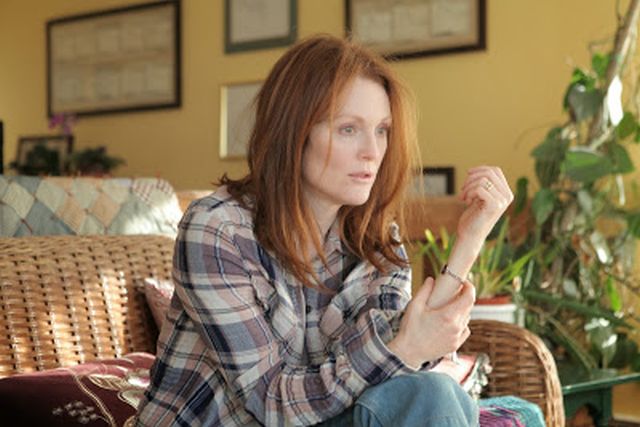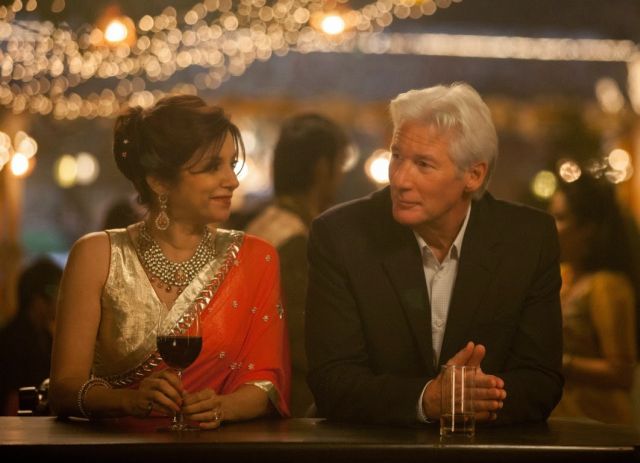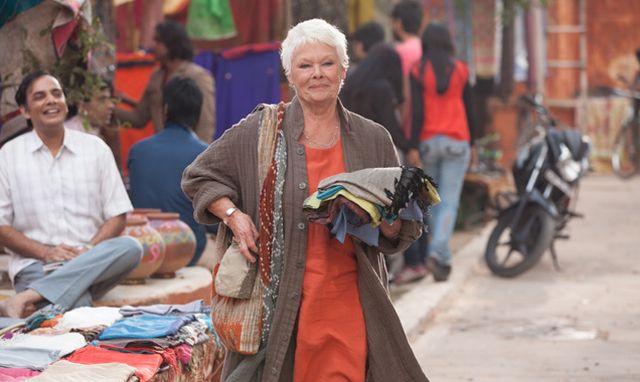The relationship between stars and their fans is symbiotic, but there are barriers for many reasons. Illusions can crumble when the star-struck come too close to their idol. Celebrities have to lead their lives, and intrusions by the obsessed hardly encourage day-to-day routine. Elle L’Adore posits a what-if which takes place when a star decides to breach the barrier.

An innocent is corrupted in South African director Neill's Blomkamp's third feature (co-written with his wife Terri Tatchell), but the kid in question is far from what you'd expect. Set in the near future, it focuses on a reprogrammed police robot with the consciousness, sensitivity and suggestibility of a child - a lovably tatty piece of tech who has been literally labelled a reject, and who sports bunny ears, graffiti and gangster bling.

Adolescence, youth culture and rebellion – often luridly and violently expressed – are the stocks in trade of American director Gregg Araki, who has one of the most distinctive voices in US cinema. But while Araki’s work has tended to exist on the fringe, White Bird In a Blizzard feels like a tiptoe into the mainstream – and the journey seems to have seriously neutered that voice.

We get the big city views of Chicago, the bright lights and the skyscrapers, a few times in Kim Longinotto’s Dreamcatcher, but for the most part we’re planted firmly down at street level, in areas of town probably you wouldn’t want to go to, a fair amount of the time at night. That’s where we first meet the film’s protagonist Brenda Myers-Powell (though I don’t think we ever actually hear her addressed by her surname), who’s cruising the streets, handing out condoms to any prostitute she can find.

Oscar winner Julianne Moore: the phrase has been a long time coming but it finally came true 10 days ago when the actress, long considered one of Hollywood's best and brightest, added an Academy Award to her groaning mantelpiece of trophies for her work in Still Alice. Is this actually the finest performance yet given by the flame-haired 54-year-old? Probably not (Far From Heaven, anyone?), and Still Alice – an entirely well-meaning venture that inspires admiration more than actual affection – is some way from the most memorable movie to yet showcase Moore's gifts.
But as a Columbia University linguistics professor who succumbs to early onset Alzheimer's, the Richard Glatzer-Wash Westmoreland collaboration tells its sorrowful story with sensitivity if no particular inspiration. Let's just say that as a platform for a performer possessed of generally unerring instincts, Still Alice joins the likes of Monster and Blue Sky among the ranks of trophied Oscar titles that will be remembered primarily for their leading ladies.
 The irony of an academic who has given herself over to the study of human language only to watch her command over her own verbal acumen, and much else, fall away in itself feels familiar. Glatzer and Washmoreland clearly love their theatre (Kristen Stewart, cast true to sullen type as one of Moore and husband Alec Baldwin's three children, here plays a budding theatre actress), and some may find echoes in this adaptation of Lisa Genova's novel with the Pulitzer Prize-winning Margaret Edson play Wit, in which an English professor dying of ovarian cancer clings to such works as Donne's "Death, Be Not Proud" even as death comes to claim her. (Stewart and Moore are pictured above)
The irony of an academic who has given herself over to the study of human language only to watch her command over her own verbal acumen, and much else, fall away in itself feels familiar. Glatzer and Washmoreland clearly love their theatre (Kristen Stewart, cast true to sullen type as one of Moore and husband Alec Baldwin's three children, here plays a budding theatre actress), and some may find echoes in this adaptation of Lisa Genova's novel with the Pulitzer Prize-winning Margaret Edson play Wit, in which an English professor dying of ovarian cancer clings to such works as Donne's "Death, Be Not Proud" even as death comes to claim her. (Stewart and Moore are pictured above)
And it wasn't quite a decade ago that Julie Christie found herself at the Oscars for playing an Alzheimer's patient in Away From Her (in the end losing the prize to Marion Cotillard's Edith Piaf), though Moore's struggle here feels more fearsome moment-by-moment, not least because the Still Alice filmmakers keep their focus on their leading lady, in effect sidelining Baldwin, Stewart, and some fine actors elsewhere in the cast. (Baldwin is clearly a good luck charm when it comes to winning Oscars for his female co-stars: he was Cate Blanchett's husband in her 2014 turn in Blue Jasmine.)
 One watches as Alice searches for a word in public or can't find the bathroom within the privacy of her own home, and it's only a shame that the creative team settle for as pat a choice for poetic citation as Elizabeth Bishop's (admittedly wonderful) "One Art", with its opening line, "The art of losing isn't hard to master." We witness the indignities of Alice unable to tie a shoe on the one hand and calling a daughter by the wrong name on the other. You get the inevitable standing ovation moment alongside a worsening chronicle of the illness-induced privations that exist behind closed doors.
One watches as Alice searches for a word in public or can't find the bathroom within the privacy of her own home, and it's only a shame that the creative team settle for as pat a choice for poetic citation as Elizabeth Bishop's (admittedly wonderful) "One Art", with its opening line, "The art of losing isn't hard to master." We witness the indignities of Alice unable to tie a shoe on the one hand and calling a daughter by the wrong name on the other. You get the inevitable standing ovation moment alongside a worsening chronicle of the illness-induced privations that exist behind closed doors.
The ending, like much else in the film, is overreliant on an extant source, this time on Tony Kushner's Angels in America, the play that budding thesp Stewart happens to have been working on as her mum's recall gives way perhaps for good. But if Still Alice has to borrow rather too often to achieve its effect, the film is lifted by one of the few actresses out there who can make even the blankest of despair feel entirely fresh.
Overleaf: watch the trailer for Still Alice

There’s an engaging, indie sense of emotional flux in writer-director Desiree Akhavan’s feature debut Appropriate Behaviour, and a very funny script indeed behind it. Akhavan herself plays Shirin, daughter of a traditional Iranian-American emigre family, who may define herself as bisexual but whose heart seems to be telling her she’s gay: she’s both distraught and angry after the film’s opening scene break-up with girlfriend Maxine (Rebecca Henderson, cooler and much more self-aware).

The oldies are back at Jaipur's Marigold Hotel and they're looking like goodies, too, thanks to a British dame or two and an Ol Parker script that knows when to leave off the breeziness and let the occasional intimation of mortality hold sway. And in a celluloid landscape plagued by sequelitis, the fact that a collective of British pensioners and their newfound Indian chums have been brought back for more is itself rather bracing compared to the usual spate of avengers, transformers or what not that keep most film franchises going.
The Second Best Exotic Marigold Hotel's 2012 predecessor chronicled how it is that so motley an array of UK retirees found themselves living the expat life, a change of pace that has so taken wing that this latest film finds the eager young hotel proprietor Sonny (Dev Patel) nursing expansionist plans of a second hostelry he can add to a burgeoning portfolio. And so it is that he heads to California to make a sales pitch, the peppery Muriel (Maggie Smith) by his side. The geographical displacement in itself allows Dame Maggie to occupy vinegary pride of place, not least when she is asked upon return to India how she found America. Her deadpan reply: "it made death more tempting." (Muriel's instructions while Stateside as to how to brew a proper English cuppa will strike a chord with many a Briton who has experienced what Americans serve as "tea".)
 Much of the film's narrative embraces what the playwright Tony Kushner has called in another context "more life", whether one is referring to the cautious Evelyn (Judi Dench) deciding to make a go of it with the Tennyson-quoting Douglas (Bill Nighy) – "we're not not together," she explains when asked; or the irrepressible Madge (Celia Imrie) sizing up the available male talent, her copy of Fifty Shades of Grey a visual clue to the old gal's appetite. To widen the amorous possibilities still further, new arrivals include Richard Gere of all people as a visiting American – 64 and single! – who gets the hots for Sonny's standoffish mum (Lillete Dubey, pictured above with Gere) and Tamsin Greig as a mysterious lone traveler who .... well, perhaps best not to give the rest of what she is up to away.
Much of the film's narrative embraces what the playwright Tony Kushner has called in another context "more life", whether one is referring to the cautious Evelyn (Judi Dench) deciding to make a go of it with the Tennyson-quoting Douglas (Bill Nighy) – "we're not not together," she explains when asked; or the irrepressible Madge (Celia Imrie) sizing up the available male talent, her copy of Fifty Shades of Grey a visual clue to the old gal's appetite. To widen the amorous possibilities still further, new arrivals include Richard Gere of all people as a visiting American – 64 and single! – who gets the hots for Sonny's standoffish mum (Lillete Dubey, pictured above with Gere) and Tamsin Greig as a mysterious lone traveler who .... well, perhaps best not to give the rest of what she is up to away.
 What's quietly appealing about the director John Madden's second go-round with this material is that these seniors are allowed not just to have a libido but also to be available for and desirous of work. Evelyn's keen eye, for instance, lands her a job sourcing fabrics, while Muriel takes to administering the hotel with the same take-no-prisoners acumen she brings to the rest of life. The actress is simply wonderful, allowing at one point that she proffers opinions, not advice, and there's a neat reference to the age difference between her and Dench's characters that mirrors the actual disparity in age (all of 19 days) between the two women, both of whom turned 80 late last year. (Dench pictured above)
What's quietly appealing about the director John Madden's second go-round with this material is that these seniors are allowed not just to have a libido but also to be available for and desirous of work. Evelyn's keen eye, for instance, lands her a job sourcing fabrics, while Muriel takes to administering the hotel with the same take-no-prisoners acumen she brings to the rest of life. The actress is simply wonderful, allowing at one point that she proffers opinions, not advice, and there's a neat reference to the age difference between her and Dench's characters that mirrors the actual disparity in age (all of 19 days) between the two women, both of whom turned 80 late last year. (Dench pictured above)
Sure, one could complain that the onscreen India envisaged here is a tad too ceaselessly colourful and charm-filled for comfort and that these people are inhabiting a fantasy-land of their own devising that doesn't relate, say, to the India one sees filling the National Theatre stage in Behind the Beautiful Forevers. But that's like faulting the film Notting Hill for not being Nil by Mouth: the two come from an entirely different place. And you have to credit all concerned for granting this second – and better – Marigold Hotel an appropriately rueful conclusion that tempers the jollity of the Bollywood-style wedding that has come just before. Or as Smith's Muriel remarks with an unforced sagacity that doesn't need to call attention to itself, "there's no such thing as an ending – just a place where you leave the story."
Overleaf: watch the trailer for The Second Best Exotic Marigold Hotel

With a similar title to Samuel Fuller’s White Dog, White God, too, is an allegory on racism with a canine slant. Where the 1982 film centred on a dog trained to attack black people, Kornél Mundruczó’s film is set in a Hungary where mixed-breed dogs are rounded up and sent to pounds. An edict from a government which is neither mentioned specifically nor seen, permits only pure “Hungarian” breeds. Mutts have to be reported.

David Robert Mitchell's second ode to innocence lost is a rather more twisted take on the subject than his first film, The Myth of the American Sleepover. That was a beautifully judged ensemble coming-of-ager which merely teased us with horror tropes. Alongside the titular teen tradition it featured an abandoned warehouse, a Ouija board, a trip down to the basement and a midnight swim. With his chilling follow-up Mitchell goes full horror, presenting us with a STH: a sexually transmitted haunting.

I hope someone by now has told Neil Patrick Harris how to pronounce David Oyelowo’s surname, but if anyone wants to see how not to host an Oscars, Harris’s stewardship of the 87th annual Academy Awards can provide that service in spades.

